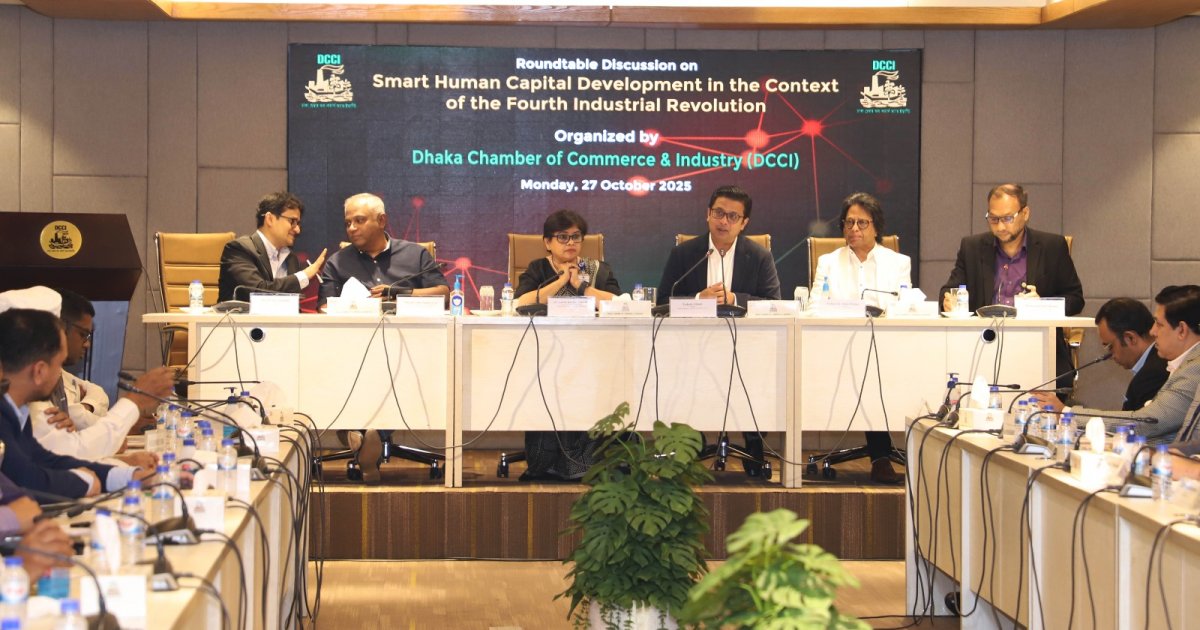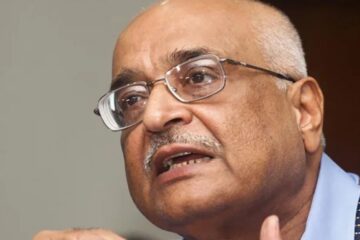It is now the demand of the hour for Bangladesh to develop technology-based skilled human resources to survive in the rapidly changing reality of the global economy. Experts emphasized strengthening coordination between the country’s education system, technical training and the industrial sector to meet the challenges of the fourth industrial revolution.
This call was made at a roundtable discussion titled “Smart Human Resource Development in the Context of the Fourth Industrial Revolution” organized by the Dhaka Chamber of Commerce and Industry (DCCI) at the DCCI auditorium in the capital on Monday.
Chief guest at the event was National Skill Development Authority (NSDA) executive chairman Nazneen Kausar Chowdhury.
DCCI president Taskin Ahmed said that the Fourth Industrial Revolution has brought about a profound transformation not only in technology but also in production, business and labor market. Artificial Intelligence (AI) is now having a huge impact on the industry and service sectors.
He also said that according to the World Economic Forum, one-fourth of the global job market will change in the next five years. Smart and technology-based human resources will be the biggest strength for Bangladesh to survive in the post-LDC competitive economy.
For this, he commented that modernization of the education system, expansion of technical education and close ties between the education and industry sectors are essential.
NSDA executive chairman Nazneen Kausar Chowdhury said: “There is still a lack of coordination among government agencies in skill development. At the same time, lack of awareness in human resource development is also a major obstacle.”
She said that a Japanese language training program has been started with the aim of sending one lakh skilled Bangladeshi workers to Japan. In addition, special emphasis is being given to developing the skills of women.
She suggested increasing public-private partnerships in addition to linking human resource development programs with the needs of the fourth industrial revolution.
M Niaz Asadullah, visiting professor of the University of Reading, UK, presented the keynote speech in the discussion.
He said that a study by A2i and UNDP has shown that about 5.38 million jobs in Bangladesh’s ready-made garments, food, agriculture, furniture, tourism and hospitality sectors may be at risk by 2030 due to technology-based production and automation.
“In this reality, we need to increase training and budget allocation to make our human resources skilled in using technology.”
Bangladesh Hi-Tech Park Authority joint secretary Mohammad Saiful Hasan called for joint efforts in Hi-Tech Parks to increase domestic and foreign investment.
Buet Prof Mohammad Masrur Ali said: “There is a huge disparity in education between rural and urban areas. It is not possible to develop skilled human resources if quality education is not ensured from the primary level.”
Raisul Kabir, CEO of Brain Station 23, said: “AI will not reduce employment, but rather new opportunities will be created based on skills. Therefore, training-centered human resource development is essential.”
ICMAB president Mahtab Uddin Ahmed said that only 20% of the country’s students get jobs according to their skills and about 2 million are unemployed.
He commented that expanding technical education and changing the mindset of the society is essential to address this situation.
East West University Vice Chancellor Prof Shams Rahman said: “Our education system is not able to produce human resources according to the needs of the industry. This deficit cannot be filled without joint efforts of education and industry.”
DCCI directors Mohammad Jamsher Ali, Mir Shahruk Islam and others also spoke at the meeting.



